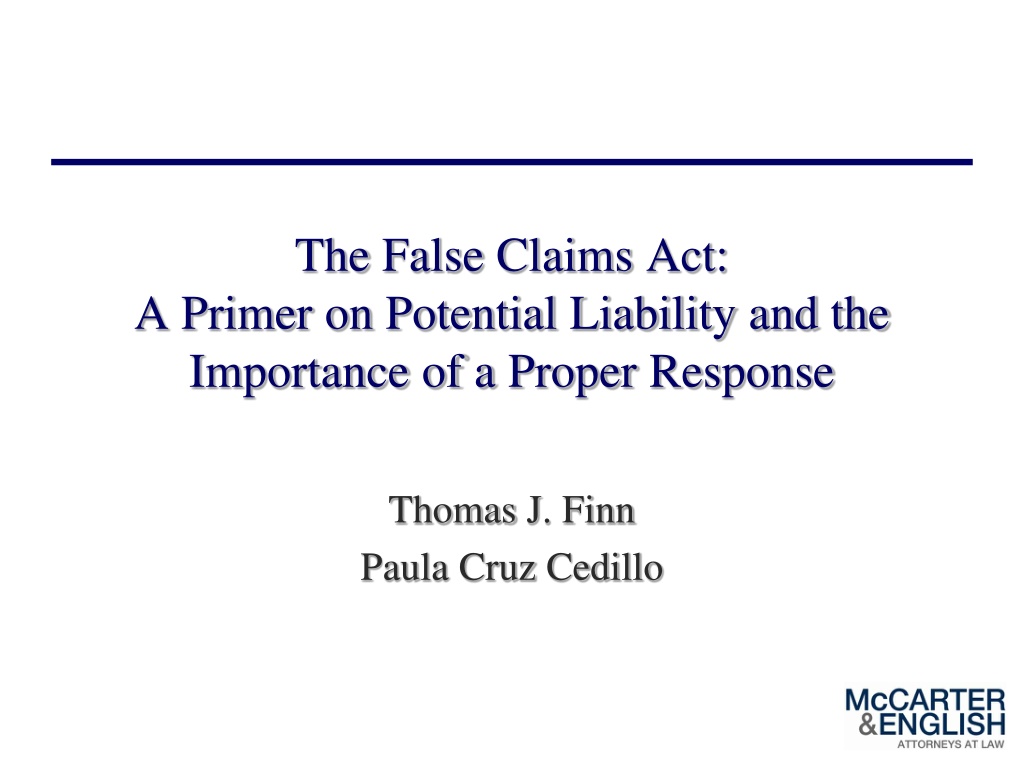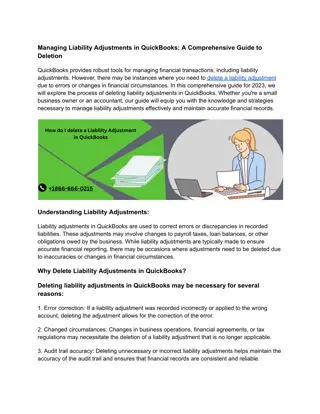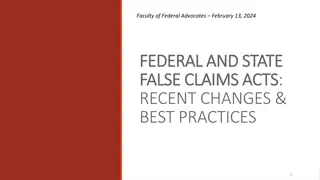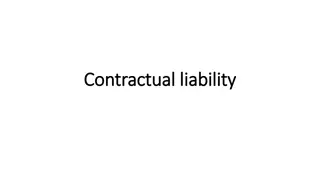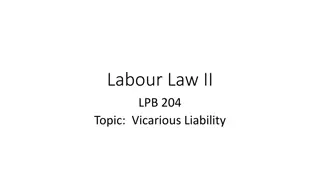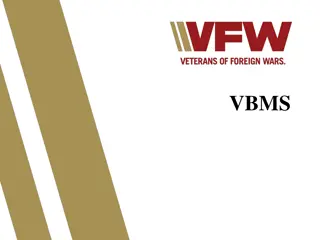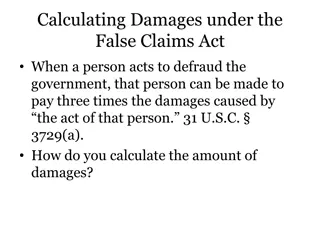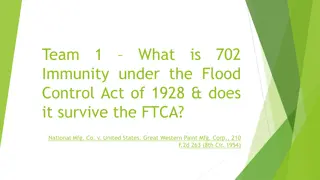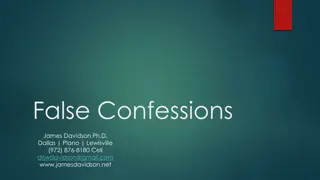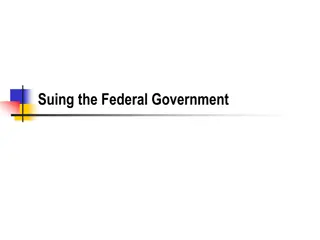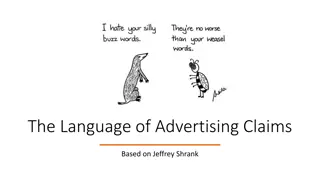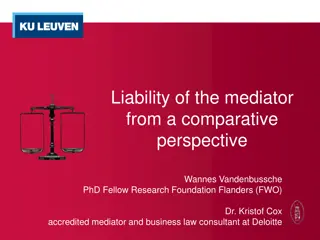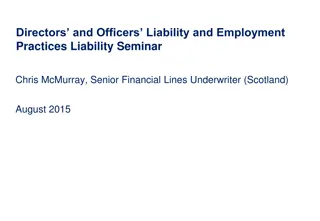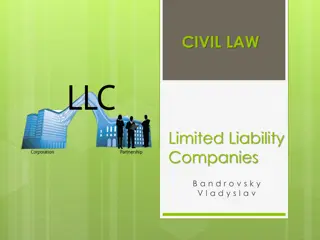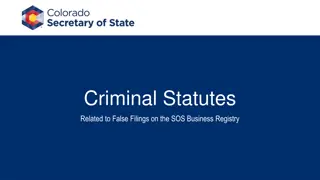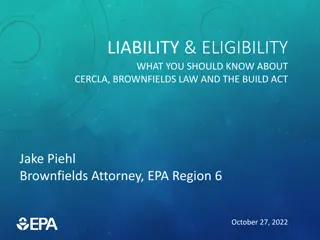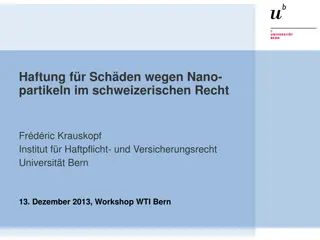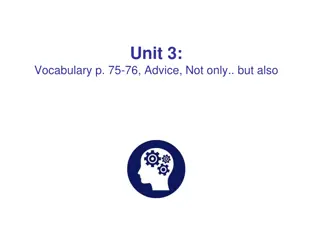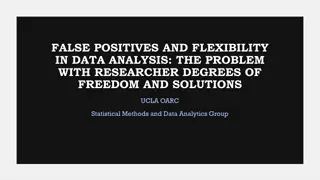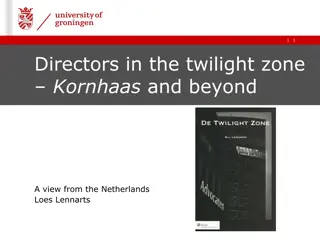Understanding the False Claims Act: Liability, Response, and Consequences
Explore the intricacies of the False Claims Act, including potential liability and the importance of proper responses. Discover the implications, penalties, and Qui Tam actions associated with false claims against the government. Gain insights into what constitutes a false claim, the penalties involved, and the unique procedures of Qui Tam actions. Learn about the roles of whistleblowers, government contractors, and the government in addressing fraud and maintaining integrity.
Uploaded on Nov 18, 2024 | 0 Views
Download Presentation

Please find below an Image/Link to download the presentation.
The content on the website is provided AS IS for your information and personal use only. It may not be sold, licensed, or shared on other websites without obtaining consent from the author. Download presentation by click this link. If you encounter any issues during the download, it is possible that the publisher has removed the file from their server.
E N D
Presentation Transcript
The False Claims Act: A Primer on Potential Liability and the Importance of a Proper Response Thomas J. Finn Paula Cruz Cedillo
Overview Trends In Claims Asserted Under the False Claims Act and Rise in Qui Tam Actions Responding to Potential Violations Potential Criminal Implications
False Claims Act Oldest But Most Powerful Tool Used to Combat Fraud Against the Federal Government FCA Prohibits Anyone from Knowingly Presenting a False Claim to the Government
False Claims Act What is a False Claim? What Does Knowingly Mean? Actual Knowledge Deliberate Ignorance Reckless Disregard for the Truth No Specific Intent to Defraud is Required
False Claims Act Penalties Range from $10,781 to $21,563 per False Claim Government Recovers Treble Damages Contractors Face Suspension & Debarment
The Qui Tam Action Allows Relator (i.e., whistleblower) to Stand in the Government s Shoes and Commence Litigation Against a Government Contractor Relator Receives a Percentage of the Recovery 15% to 25% if Government Intervenes 25% to 30% if Government Does Not Intervene, as well as Attorneys Fees and Costs
The Qui Tam Action Unique Procedure of Qui Tam Actions Creates Unique Issues for Government Contractors Complaint is Filed Under Seal Allegations Are Investigated by Government Government Then Determines Whether to Intervene Relator May Pursue Lawsuit Even if Government Does Not Intervene Relator Entitled to Receive Portion of Recovery
The Qui Tam Action Competing Interests & Complex Dynamic All Working Against Government Contractor Department of Justice (DOJ) or U.S. Attorney s Office The Fight Against Fraud & Restoring Public Faith Recouping Funds for the Government The Defrauded Government Agency Maintain Long-Standing & On-going Relationship with Government Contractor The Relator Personal Financial Interest
Trends in FCA Claims and Qui Tam Actions Congress Increased Efforts to Combat Fraud by those Receiving Government Funds Fraud Enforcement and Recovery Act of 2009 Patient Protection and Affordable Care Act Amendments Have Had Serious Impact on FCA Liability
Trends in FCA Claims and Qui Tam Actions $4.7 Billion in Settlements & Judgments in 2016 A $1.2 Billion Increase Over the $3.7 Billion Recovered in 2015 $2.9 Billion Recovered Through Qui Tam Actions $31 Billion Recovered Since January 2009
Fraud Enforcement and Recovery Act of 2009 (FERA) Claim Means Any Request for Money Whether Presented Directly to Government or Anyone Else Ultimately to be Spent or Used by the Government or to Advance a Government Program Effect? FCA Applies to Anyone Who Touches Federal Funds May Subject Any Person or Entity to an FCA Claim Regardless of Whether Actually Intended to Submit a False Claim to the Government Regardless of Whether Contractor Knew Government was the Ultimate Purchaser of Goods
Fraud Enforcement and Recovery Act of 2009 (FERA) Increased Government s Investigative Capability through Use Civil Investigative Demands (CIDs) Attorney General Can Delegate Authority to Issue CIDs U.S. Attorneys Have Authority to Issue CIDs Effect? Increased Use and Impact of CIDs Contractors Can be Compelled to Turn Over Requested Documents, Respond to Interrogatories, and Depositions Can be Taken of Company Personnel Very Early On Even Before Government Intervenes Information Can be Shared with Whistleblowers
Universal Health Services, Inc. v. United States ex rel. Escobar US Supreme Court Recognized - But Clarified - the Implied False Certification Theory of Liability Claim Makes Specific Representations About Goods or Services Provided Failure to Disclose Noncompliance with Material Statutory, Regulatory, or Contractual Requirements Renders Representations Misleading Liability Not Dependent on Whether Requirements are an Express Condition of Payment
Responding to Suspected or Potential Violations of the FCA How Do Contractors Receive Notice of Purported Misconduct? Internally Employee Hotlines or Reporting Procedures Internal Company Audits Traditional Government Investigative Tools Grand Jury Subpoena Search Warrant
Responding to Suspected or Potential Violations of the FCA Government Investigative Tools Unique to Government Contractors Inspector General Subpoena Civil Investigative Demand The Qui Tam Call
Responding to Suspected or Potential Violations of the FCA Unique Considerations for Contractors Significant Investigation Already Completed by Government and Whistleblower Prior to Contractor s Awareness of Claim Contractor May Want to Settle Before Qui Tam Action is Unsealed in Order to Minimize Bad Publicity
Responding to Suspected or Potential Violations of the FCA Maintain or Salvage Business Relationship with Defrauded Government Agency Convince Government Not to Intervene Because Claims are Meritless
Responding to Suspected or Potential Violations of the FCA In this Climate, Government Contractors Must: Have Heightened Sensitivity to Allegations of Wrongdoing Be Quick to Conduct Internal Investigation and Thoroughly Investigate Purported Wrongdoing Determine Whether Violation Exists in Order to Minimize Consequences Take Great Care When Responding to Government Inquiries
Internal Investigation Internal Investigations are Critical To Determine Credibility of Allegations To Assess Scope of Alleged Wrongdoing To Help Mitigate Resulting FCA Liability To Convince the Government Not to Intervene in Qui Tam Action
Internal Investigation Importance of No Government Intervention The Government Has Significant Resources Has Significant Institutional Knowledge & Expertise Government s Decision Not to Intervene Strengthens Contractor s Position Relator s Resources are Likely Limited
Self Reporting Obligations Contractor Must Decide Whether to Report Results of Internal Investigation Voluntary Disclosure Formal Voluntary Disclosure Program Cooperation May Result in Reduction of FCA Damages Mandatory Disclosure Nondisclosure Itself Would Constitute a Crime
Potential Criminal Implications High Probability that Allegations Against Government Contractor Will Also be Reviewed for Possible Criminal Prosecution If Government Pursues a Civil Fraud Investigation, Will Likely Also Conduct a Parallel Criminal Investigation
Effect of Parallel Criminal Investigation Information from Internal Investigation or Civil Proceedings Used in Criminal Matter Contractor s Choice to Voluntarily Self Report Demonstrate Good Faith and Cooperation Disclosure of Internal Investigation to Escape Indictment Beneficial in Prosecutor s Charging Decisions and Sentencing
The False Claims Act: A Primer on Potential Liability and the Importance of a Proper Response Thomas J. Finn Paula Cruz Cedillo
